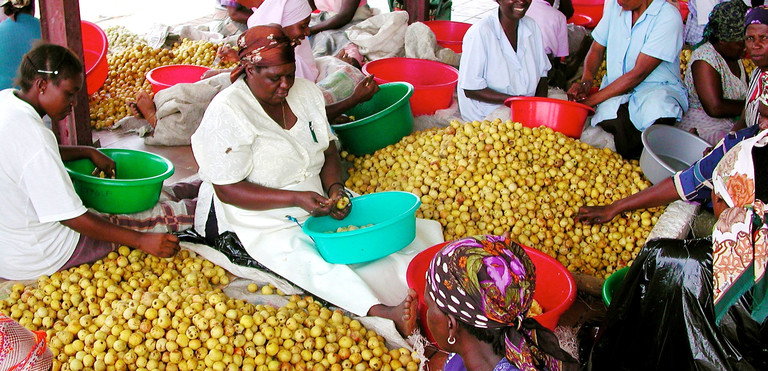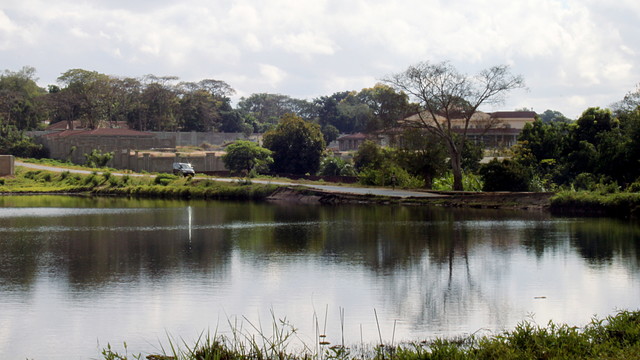Encouraging collaboration: drafting a new law to stop biopiracy in Namibia
Communities and indigenous groups have worked with Namibian government departments to analyse the value of their country's biodiversity and shape a national bill to protect genetic resources and the ecosystems in which they live.

Women opening the fruit of the marula tree to extract the kernel for making marula oil (Photo: CIFOR, Creative Commons via Flickr)
Biopiracy – the appropriation of the knowledge and genetic resources of indigenous communities without permission or compensation – has been a serious problem for Namibia.
Lazarus Kairabeb, secretary general of the Nama Traditional Leaders Association, says the lack of legitimate opportunities for communities to benefit from biological resources has allowed biopiracy to thrive. For example marula oil and the hoodia plant are lucrative commodities internationally, yet neither Namibia nor its communities have benefited from their sale.
We have had corporations from the developed world claiming ownership of our genetic resources and traditional knowledge and it has been made easier by a kind of symbiotic relationship between some sections of the community and the biopirates – Lazarus Kairabeb
He says tensions, disaffection and illegal use of resources by local people occur because of the pressures of poverty and the lack of any kind of regulation requiring private companies to compensate the communities, or even recognise them as stakeholders in the international business.
Talking about benefit sharing
In a bid to tackle this issue, the Namibian government set up an Interim Bioprospecting Committee in 2007 to discuss genetic resources and benefit sharing with different organisations and local communities.
The committee, chaired by the Ministry of Environment and Tourism, brought together departments from across government, including the Ministry of Agriculture, Water and Forestry, the Ministry of Trade and Industry and the Ministries of Justice and Education, as well as the University of Namibia and representatives from the private sector and non-governmental organisations.
The committee's first step was to draft an indigenous local community strategy on access to benefit sharing. The aim was to give local communities a say on which resources could be shared and how.
If, for example, an international buyer or their representative wanted to harvest marula oil or devil's claw, it was proposed that they should sign a contractual agreement before extracting the resource.
In 2011, the then Minister of Environment and Tourism, Netumbo Nandi Ndaitwah, injected new energy into the efforts to enshrine these principles into law. A bill was drafted based on the principles of the Nagoya Protocol, the international agreement on sharing the benefits arising from the utilisation of genetic resources. Namibia had played a key role in the negotiations on the protocol.
Participants ranging from government institutions to the police and home affairs departments and traditional authorities, were brought together to understand the implications of biopiracy at national and local levels and contribute to the bill's content.
Cooperation between institutions was strong, says Ndapanda Kanime, chief conservation scientist in the Department of Environmental Affairs. She thinks the situation was helped by the existing structure of topical cross-department steering committees – the Interim Bioprospecting Committee being one of them – which had already fostered a spirit of collaboration.
Committee members were willing to share information and play a part in discussions and felt responsible for going back to their ministries to update colleagues on progress.
At the same time, the environment ministry team went out into villages and local communities. They consulted traditional leaders and chiefs on what the bill should contain, encouraging buy-in to the political process.
In a complex logistical exercise to designed to ensure that participants from Namibia's 14 regions could participate, five regional meetings were held between June and August 2011, in locations as far apart as Caprivi in the east of Namibia and Karas in the south. A national workshop on the final bill was held in 2012.
Recognising biodiversity's role
Decision makers at all levels are beginning to recognise the role and value of biodiversity in the culture and economy of the country.
 A 2012 UNEP report on the potential of biotrade for Namibia found that legal biotrade represented around 4.5 per cent of contribution to Namibia's GDP. It said biotrade would particularly important for the country's poverty reduction efforts in rural areas – provided that harvesters and other 'resource stewards' received a greater share of the retail value of the resources being traded.
A 2012 UNEP report on the potential of biotrade for Namibia found that legal biotrade represented around 4.5 per cent of contribution to Namibia's GDP. It said biotrade would particularly important for the country's poverty reduction efforts in rural areas – provided that harvesters and other 'resource stewards' received a greater share of the retail value of the resources being traded.
The draft bill states that any person who wants to conduct research, commercialise or add value to any genetic resource, including a genetic resource associated with traditional knowledge, must first gain a permit from the Ministry of Environment and Tourism. It also makes clear that external actors must obtain a letter of consent from a local leader to research or export a natural product.
Kairabeb points out that traditional leaders will need the support of strong local institutions in order to be able to insist that international corporations abide by the bill. Support could come from well-resourced conservancy committees. He welcomes the fact that national government consulted outside its own departments and believes developing and protecting the biotrade is an ongoing learning process.
Next steps
 Since 2012, officials from the Ministry of Environment and Tourism have engaged with parliamentarians in Namibia's upper and lower houses to explain the significance of the bill. Despite members of parliament changing over that time, many people are now briefed about the potential for biotrade and the negative effects of biopiracy.
Since 2012, officials from the Ministry of Environment and Tourism have engaged with parliamentarians in Namibia's upper and lower houses to explain the significance of the bill. Despite members of parliament changing over that time, many people are now briefed about the potential for biotrade and the negative effects of biopiracy.
Namibia's Cabinet Committee on Legislation certified the draft bill in early 2015. The change of government in March 2015 delayed the bill, but the Ministry of Environment and Tourism is hopeful that the bill will obtain presidential approval in the 2015/16 financial year.
Meanwhile the Interim Bioprospecting Committee is providing guidance on regulations needed to support the bill once it becomes law, including deciding which institutions need to be involved in its enforcement.
Resources
- Biotrade – a catalyst for transitioning to a green economy in Namibia, UNEP (2012)
- Stories of change: mainstreaming biodiversity and development, IIED, UNEP-WCMC (2015) IIED tool
- Indigenous natural products, National Botanical Research Institute report
Contact
Dilys Roe (dilys.roe@iied.org), principal researcher and biodiversity team leader, IIED's Natural Resources Group
John Tayleur (john.tayleur@unep-wcmc.org), senior programme officer, Ecosystem Assessment, United Nations Environment Programme




